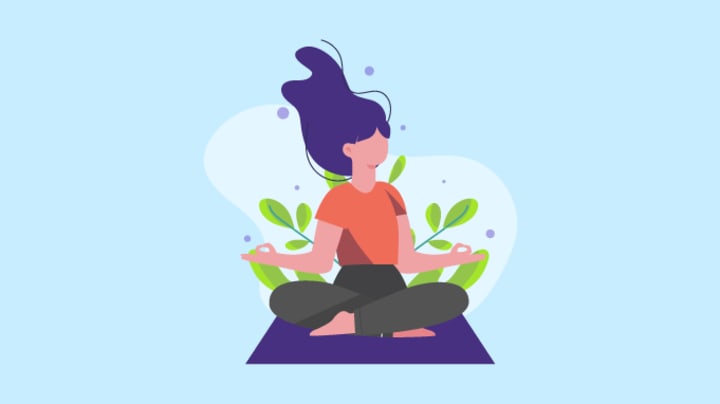Find Your Zen
Exploring the Benefits and Tips for Incorporating Meditation into Your Daily Life

Meditation has been practiced for thousands of years and is considered one of the most effective techniques for promoting relaxation, reducing stress, and improving mental and physical health. Despite its ancient roots, meditation has gained popularity in recent years, with many people incorporating it into their daily routines. In this article, we'll explore the benefits of meditation and provide some tips for incorporating this practice into your life.
What is Meditation?
Meditation is a practice that involves focusing the mind on a particular object, thought, or activity to achieve a state of mental and physical relaxation. The most common forms of meditation include mindfulness meditation, Transcendental Meditation (TM), and Loving-Kindness Meditation (LKM).
In mindfulness meditation, the individual focuses their attention on the present moment, observing thoughts and feelings without judgment. TM involves the use of a mantra to help quiet the mind, while LKM focuses on generating feelings of love and kindness towards oneself and others.
Benefits of Meditation
There are many benefits associated with regular meditation practice, including:
- Reduced Stress and Anxiety: Meditation has been shown to reduce levels of stress and anxiety, promoting a sense of calm and relaxation.
- Improved Focus and Concentration: Regular meditation practice can improve focus and concentration, leading to improved productivity and performance. Learn more about meditation
- Enhanced Emotional Wellbeing: Meditation can improve emotional regulation, reducing symptoms of depression and promoting feelings of happiness and contentment.
- Better Sleep: Meditation can help reduce insomnia and improve the quality of sleep, leading to better overall health and wellbeing.
- Improved Physical Health: Meditation has been shown to reduce blood pressure, lower levels of inflammation, and improve immune function.

Tips for Incorporating Meditation into Your Life
If you're interested in incorporating meditation into your life, here are some tips to get started: Learn more about meditation
- Find a quiet and comfortable space: Choose a quiet and comfortable space where you can meditate without distractions.
- Start with a few minutes each day: Start with just a few minutes each day and gradually increase the duration of your meditation practice.
- Focus on your breath: Begin by focusing on your breath, observing the sensation of air moving in and out of your body.
- Use guided meditation: Consider using guided meditation resources such as apps, videos, or recordings to help you get started.
- Be patient and kind to yourself: Remember that meditation is a practice, and it takes time to develop. Be patient and kind to yourself throughout the process.
In conclusion, meditation is a powerful tool for promoting relaxation, reducing stress, and improving mental and physical health. By incorporating regular meditation practice into your life, you can experience these benefits and achieve a greater sense of wellbeing. So take a few minutes each day to quiet your mind, focus on your breath, and enjoy the benefits of this ancient practice.
It's true that there is no one-size-fits-all approach to meditation, and what works for one person may not work for another. Some people find that focusing on their breath helps them calm their mind and enter a meditative state, while others may prefer to use a mantra or visualization technique.
One important thing to keep in mind is that meditation is a practice that requires time and patience. You may not notice the benefits of meditation right away, but with regular practice, you will likely begin to experience a greater sense of peace, relaxation, and wellbeing.
It can be helpful to establish a regular meditation routine to make it easier to stick with the practice. This can involve setting aside a specific time and place for meditation each day, as well as committing to a specific duration of time for your practice.
Many people find it helpful to use guided meditations, which can be found in various forms such as apps, recordings, or online videos. Guided meditations can help beginners get started with the practice and provide a framework for their meditation.

Another useful tip for beginners is to start with shorter meditation sessions and gradually increase the duration over time. Starting with just a few minutes each day and gradually building up to longer sessions can help you develop the habit of meditation without feeling overwhelmed.
It's also important to remember that meditation is not a one-time fix for stress and anxiety. It's a long-term practice that requires ongoing commitment and effort. However, with regular practice, meditation can help you develop greater self-awareness, improve your ability to cope with stress, and enhance your overall sense of wellbeing.
In conclusion, meditation is a powerful practice that can help you achieve greater peace, relaxation, and wellbeing. While there is no one-size-fits-all approach to meditation, it's important to find a practice that resonates with you and make it a regular habit. With time and practice, you can experience the many benefits of meditation and cultivate a greater sense of calm and balance in your life.





Comments
There are no comments for this story
Be the first to respond and start the conversation.